Giving and receiving gifts is an important part of any relationship. Receiving a gift, even a symbolic one, makes a person feel appreciated, loved, and seen, and it can strengthen the bond between two people. That’s if the recipient likes the gift, of course.
This couple ran into a disagreement about the boyfriend’s inability to give good, thoughtful gifts. While the girlfriend showered him with expensive, elaborate presents, the boyfriend decided to gift her a photo album with pictures of his last solo trip. Not sure whether she overreacted in her disappointment about the bad gift, the woman decided to ask the Internet’s opinion.
Giving and receiving gifts with your partner shows appreciation and brings you two closer

Image credits: Zinkevych_D / envatoelements (not the actual photo)
This woman had enough of her boyfriend’s bad gifts after receiving his solo travel photobook






Image credits: AnnaStills / envatoelements (not the actual photo)
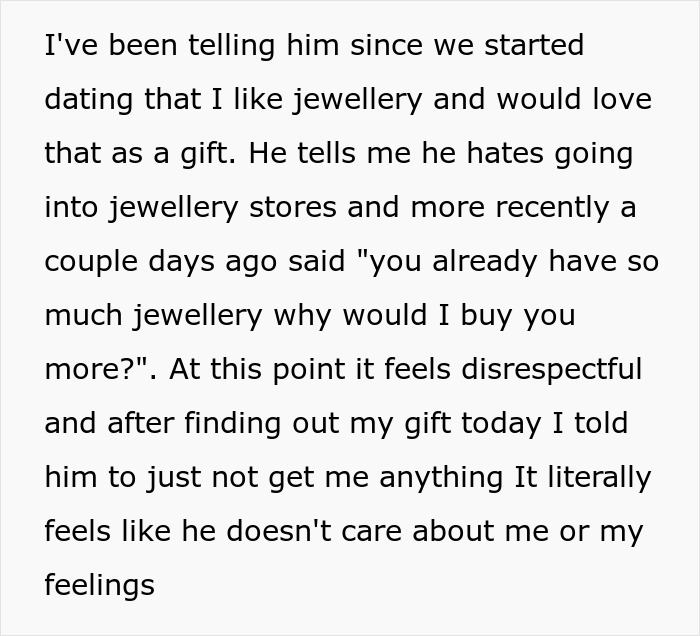

Image credits: ilikepeaches24

Image credits: Farknot / envatoelements (not the actual photo)
People often misunderstand those who like receiving gifts, but they’re neither materialistic nor shallow
‘Receiving gifts’ is one of the five love languages in the now-iconic The 5 Love Languages: The Secret to Love That Lasts by Gary Chapman. Although it’s not a scientifically validated construct, many experts believe it’s a helpful way to categorize people’s behavior in relationships.
“Approaching relationships from the love language perspective is really productive,” says Mark Williams, a licensed mental health counselor and relationship coach. “By learning how to ‘speak’ each other’s love language, you’re ensuring both people in a relationship feel supported and seen.”
It’s true that some people value receiving gifts more than others do. A partner might like receiving jewelry way more than spending quality time together by sitting on the couch and watching TV. Sometimes, others misunderstand their need to share love through presents as materialistic or greedy.
However, that notion isn’t true. Experts even go as far as to say it’s the most misunderstood of the five love languages. Oftentimes (just like in this story), the person whose love language is receiving gifts has nothing against inexpensive or ‘uncool’ presents. It’s always the thought that counts.
“Whether that item is a tiny trinket from a thrift store or a 50-foot sailboat is inconsequential,” Williams explained. “Either convey the same message: ‘I was thinking about you when I saw this. You’re always on my mind.'”
Giving gifts requires much attention to detail from the partner. They have to carefully follow the subtle likes and dislikes of the person. Special occasions like birthdays and Christmas are very important, too. Chapman wrote that forgetting that person’s birthday is like a dagger to their heart.
Judging from what decision the author of this story made later, her love language most probably was receiving gifts.
Researchers might’ve debunked love languages, but people still believe them

Image credits: MaaHoo / envatoelements (not the actual photo)
Chapman worked as a pastor with couples and wrote the book about the patterns he noticed while counseling them. He never claimed to be a researcher; he merely described the behavior patterns he saw in the people he counseled.
“I’m not a researcher,” Chapman has said. “But I do think that there are significant numbers of people over the 30 years who have found that concept to be the thing that turned their marriage around emotionally.”
In 2024, a team of Canadian researchers set out to find whether there was any evidence behind Chapman’s classification. His main claim was that every person has a primary love language, one that’s more pronounced in the person than others.
However, the researchers found the opposite. Most of their study participants rated all five love languages highly. One of the co-authors of the study, Emily Impett, said that people might find more than one love language meaningful.
“In real life, we know that people often don’t need to make these kinds of trade-offs between do you want a partner who is going to touch you versus express love in some other way,” she told The Washington Post.
Despite this debunking, fans of the concept choose to continue adhering to it. Many couples think it’s a nice guideline when considering what their partner wants in the relationship. One woman told The Guardian: “It’s helped explain to me why I dated certain people, and why it didn’t work out. Why can’t they just let us have fun with it? If we want to live in our delusions, let us.”
The girlfriend gave more info about what her boyfriend is like in other aspects of the relationship






People said it’s not about the gifts; it’s about the fact that the BF doesn’t bother to make an effort

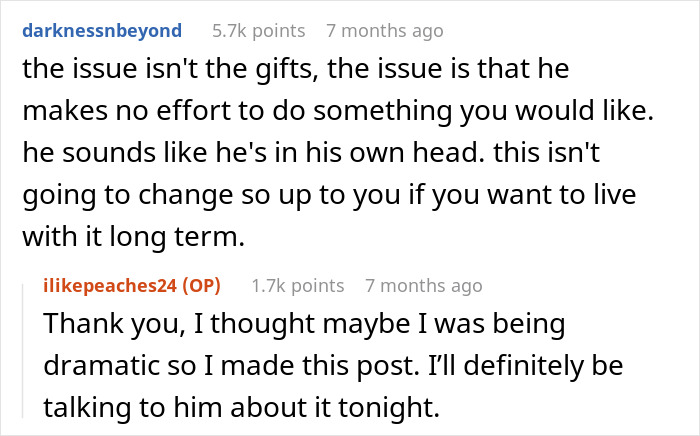




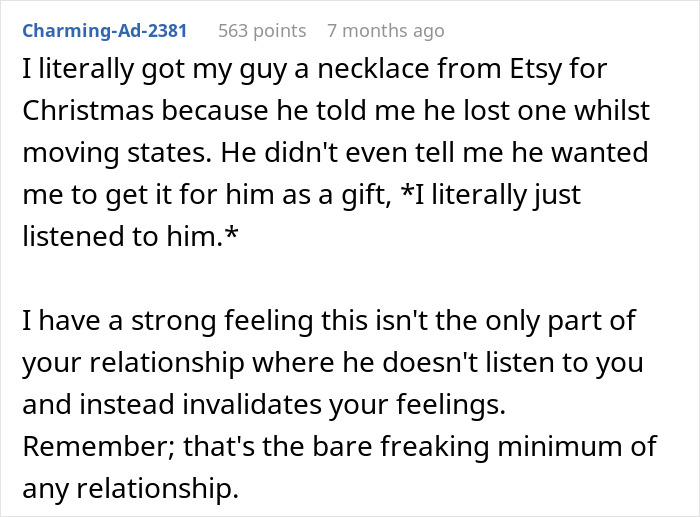





However, others called the girlfriend ungrateful and materialistic





The woman later posted an update, and the news wasn’t good
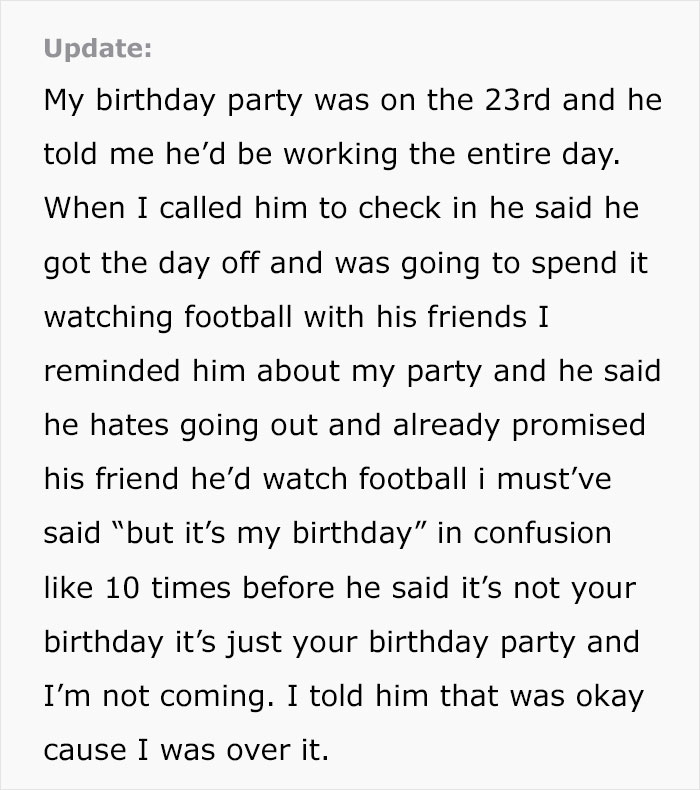
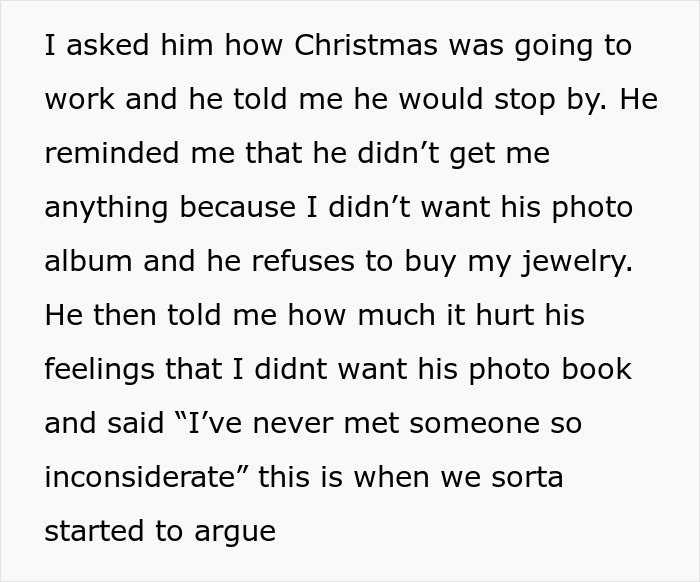
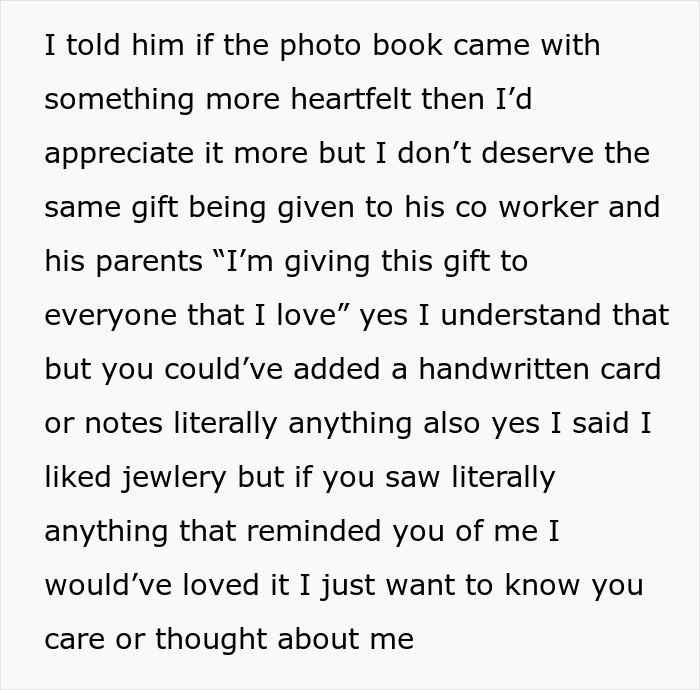


Image credits: Tirachard / envatoelements (not the actual photo)


Image credits: ilikepeaches24
“Good riddance,” said people, congratulating her on getting out of a bad relationship










